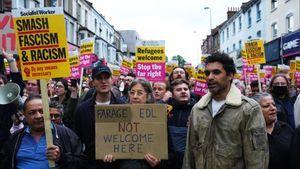The Gaza Strip has been thrust back under the microscope, and the humanitarian crisis affecting its population—especially children—is becoming more dire by the day. Last October, Hamas and other Palestinian armed groups launched brutal attacks on Israeli communities, leading to increased violence and retaliation from the Israeli military. The children living there now face unimaginable hardship—many have lost their homes, access to education, and the chance for a normal childhood.
According to the UNICEF Deputy Executive Director for Humanitarian Action, Ted Chaiban, there's now talk of losing an entire generation of children to conflict. Speaking from the West Bank, he recently briefed journalists about the desolation and suffering he witnessed during his trips to Israel and Palestine. He emphasized the urgent need for both a ceasing of hostilities and political negotiations prioritizing the well-being of children from both sides.
“They asked me to be the voice of all children to relay their suffering,” Chaiban stated after meeting with families and kids impacted by the attacks, aiming to shine a light on their plight.
Gaza, particularly, has become synonymous with despair. Chaiban revealed shocking scenes during his visit to the Kamal Adwan Hospital—the region's only remaining pediatric unit. He described the harrowing image of infants wounded, parents grieving, and children deprived of care due to lack of resources and the constant threat of bombardment. Chaiban observed, "The baby is a stark reminder of the thousands upon thousands of children who have been killed and injured since the war erupted. If we do not evacuate them, many won’t survive without immediate medical attention—a reality we must act on urgently with the cooperation of the World Health Organization (WHO)."
It's not just the immediate physical injuries; the psychological scars are likely to be long-lasting. Children are losing months, even years, of education. Schools have been repurposed as makeshift refugee shelters, compounding the challenges for those still able to attend class. Chaiban recounted his visit to one such school, highlighting the squalid living conditions: families surviving amid open sewage systems dug to manage waste. He warned of rampant disease outbreaks resulting from these unsanitary conditions. "This is not living; it’s surviving under horrific circumstances," Chaiban noted.
Compounding these challenges, there has been a significant decline in humanitarian aid reaching Gaza. From earlier peaks of nearly 100 trucks daily, supplies have been dwindling, leaving many families without essentials such as fresh food and proper nutrition. Official reports highlighted aid deliveries falling sharply from January's 100 trucks to just 15 by September, creating growing desperation and fear.
Chaiban made clear the time for action is now. “We need to see immediate pauses to deliver much-needed aid, particularly during vaccination campaigns like for polio,” he said. He implored leaders for enhanced security for aid workers and established protocols to streamline the delivery of essentials.
Meanwhile, concerns about children's safety continue to pour from international human rights bodies. Reports indicate alarming statistics, including over 11,300 children killed since the escalation began following Hamas’ attack. The Committee on the Rights of the Child condemned Israel's conduct, particularly noting the high casualties among Palestinian youth, many of whom suffer chronic health issues and inadequate access to necessary treatments.
Yet, it is not just the violence impacting children directly. The United Nations has pointed out the continued abduction and detention of Palestinian children without due process. Reports of children being held with little evidence of wrongdoing—often without seeing the inside of a courtroom—illustrate another layer to the despair children endure.
On another front, humanitarian agencies remain focused on those children traumatized by violence. Medical personnel at hospitals are trying to tend to the influx of injured young ones, only to be met with overwhelming conditions. The current shortages of medical supplies and psychological support threaten to deepen the crisis.
Chaiban's visit also reiterates how international attention is needed now more than ever. "We must focus on facilitating aid, protecting lives, and providing stable environments where children can heal and regain their footing,” he stressed. Fresh food, safe drinking water, and opportunities to learn are urgently required to prevent what could become the most extensive and tragic loss of youth to conflict seen to date.
The brick and mortar of Gaza—the homes and schools—are crumbling, but the aspirations and dreams of its children must not collapse. A collective international effort toward peace and humanitarian support could still light the path to healing for this beleaguered population. The fate of the next generation hangs precariously as the dialogue and actions taken today will determine their future.
Outside of Gaza, these concerns echo. Recent incidents across the Middle East, including atrocities committed via the recent misuse of communication devices resulting in unwarranted violence, highlight the urgent need for adherence to international law and the protection of civilians. Experts observed recent technological warfare threatening lives, using exploding pagers and radios indiscriminately against populations. Calls for investigations and accountability are intensifying, stressing the desperation for clarity and reason within the chaos around Gaza.
What seems evident from on-the-ground reports and sentiments from officials is the undeniable need to prioritize children’s safety, well-being, and futures. The time for superficial resolutions is long gone; real change, rooted deeply in dialogue and commitment to humanitarian principles, is now necessary to avert the looming catastrophe facing yet another generation caught in the crossfire of conflict.
Every voice matters, especially those of children who aspire to live, learn, and thrive outside the shadows of war. The world watches, waiting—and hoping for peace.



